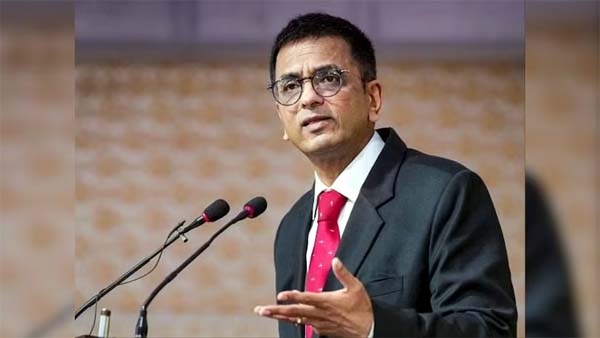NEW DELHI, Nov 27: Access to justice cannot be secured only by crafting pro-people jurisprudence in judgments, but requires active progress on the administrative side of a court, such as improving infrastructure and enhancing legal-aid services, Chief Justice of India D Y Chandrachud said on Monday.
Speaking at the first “Regional Conference on Access to Legal Aid: Strengthening Access to Justice in the Global South” organised by the National Legal Services Authority (NALSA) here, Justice Chandrachud said the challenge before judges is not to do justice in the facts of an individual case, but to institutionalise the processes and look beyond the immediate as well.
The CJI said the judiciary has the potential to play an extraordinary role in strengthening access to justice, as has been uniquely displayed by several countries in the “Global South”.
He said the complexities of law and process, the inequality between ordinary citizens and powerful adversaries, judicial delays and the belief that the system works against marginalised communities are among the various barriers that stand in the way of equal access to justice.
“Access to justice is not a right that can be secured only by crafting pro-people jurisprudence in our judgments, rather it requires active progress on the administrative side of the court as well,” Justice Chandrachud said.
He said the discourse about human rights and access to justice has historically been monopolised by voices from the Global North (industrialised nations), which makes such dialogues unsuitable.
He said it is imperative to amplify the justice needs of the under-represented populations in our country.
The CJI said the concept of justice has historically been construed as applicable solely within the confines of a sovereign state.
“Given the intricate web of transnational relations in the present age, our concepts of justice have also changed. In transnational relationships, all nations are not treated equally. However, some nations share a sense of solidarity and belonging. It is here that constructed categories, such as Global South, become important points of collaboration, dialogue and deliberation.
“This term is not geographical but based on political, geopolitical and economic commonalities between certain nations. Several nations in the Global South, including India, have historically been at the receiving end of imperialism or colonial rule. This history resulted in a relationship of unequal power with such nations being forced into the periphery of the economy. It is for this reason that before academics used the term Global South, terms such as developing, the underdeveloped or third world gained wide currency,” he said.
Justice Chandrachud said there has been a universal shift in wealth from the Mediterranean to the Asia Pacific.
“By 2030, it is projected that three of the four largest economies will be from the Global South. The GDP in terms of purchasing power of the Global South-dominated BRICS nations surpasses that of the so-called Global North’s G7 club. One of the reasons why nations in the Global South have been able to achieve economic prosperity is their willingness to recognise their unique needs and collaborate with each other.
“This conference serves as a starting point for the nations to expand beyond the mere economic and trade alliances and make cooperation between our legal systems a key priority,” he said.
This commitment to collaboration between the nations of the Global South drives them not only to come together, but also serves as a reminder that their institutions play an important role in promoting and upholding the rule of law.
Justice Chandrachud said during his tenure as the CJI, he has initiated several initiatives for access to justice and the most potent and important weapon in access to justice is technology.
“Today, the Supreme Court is successfully using technology in myriad ways to bring the courtroom closer to the citizens. I am certain that several of you have had the opportunity to watch the live stream of proceedings before the Constitution benches of the Supreme Court. In many ways, online streaming of proceedings has taken the Supreme Court to the hearts and homes of common citizens of the country,” he said.
The CJI said countries, including India, have developed ingenious legal practices to strengthen access to justice.
“For instance, since the early 1980s, the Supreme Court has made revolutionary attempts to increase access to justice by way of its public interest jurisprudence. The court removed procedural barriers to access the Supreme Court and allowed all citizens to approach the court for the amelioration of socio-economic injustices. This jurisprudence resulted in the Supreme Court being widely regarded as the ‘people’s court’, he said.
Justice Chandrachud said an integral part of securing access to justice is making the courtroom a space that is accessible to persons belonging to diverse communities cutting across age, gender identity, caste and economic status.
The first step in this direction is ensuring that the physical infrastructure of the court accommodates all citizens, he added.
Vice President Jagdeep Dhankhar, Union Law Minister Arjun Ram Meghwal, G20 Sherpa Amitabh Kant, Supreme Court judges S K Kaul and Sanjiv Khanna and Attorney General R Venkataramani also spoke on the occasion. (PTI)


